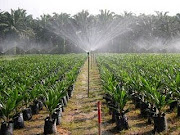
CBIP mulls power supply to rural areas via palm oil mills
PalmOilHQ August 3, 2009 9:00 GMT+8
Palm oil mills can use biomass and biogas to generate electricity and contribute to the national grid, says CB Industrial Product’s managing director. CB Industrial Product Holding Bhd (CBIP) (7076), known for its automated Modipalm mills and organic fertiliser plants, is looking to build renewable energy plants to power up rural villages surrounding oil palm estates.
With almost 30 years of experience in building palm oil mills, CBIP has evolved to be a niche mechanical engineer that offers green technology at affordable rates in the oil palm industry. “Palm oil mills are more or less self-sufficient now. From being a consumer, mills can use biomass and biogas to generate electricity and contribute to the national grid,” managing director Lim Chai Beng told Business Times in an interview in Shah Alam, Selangor.
Lim said the next step in the right direction is to find ways to generate electricity more efficiently and lower the cost of hooking up to the national grid so that rural villages within 5km from the mill can enjoy continuous power supply.Asked how soon this renewable energy plant initiative can materialise, Lim said much will depend on incentives to be offered by the government to oil palm estate owners. “Right now, the return on investment is not worthwhile. There has to be some incentives from the government.”
On CBIP’s core business, Lim said oil palm planters have everything to gain to upgrade their conventional mill to an automated Modipalm. “A Modipalm is compact. It takes up less space, fuel and labour; produces more and better quality oil; and is kinder to the environment,” he said. At a Modipalm mill, there is no need for tractors and hydraulic skid-steer loaders or wire-rope winches to move the fruit-cages around. There is also no need for monorail hoists to lift the cages to the threshing machine.
This means less machinery to maintain and, in two shifts, the Modipalm mill only need 25 workers or half the staff strength to operate a conventional 40-tonne mill processing 200,000 tonnes of fresh fruit bunches in a year. Also, since mill owners need not invest in that many tractors, there is savings on diesel and tyres. In the Modipalm continuous sterilisation process, fruit bunches are split using a double-roller bunch splitter for effective air-removal and steam penetration. Low pressure steam is used throughout the whole process.
Since Modipalm does not have any high-pressure cookers, it is not subjected to annual shutdown for inspection and certification by the Department of Occupational Safety and Health, thus, reducing maintenance cost and downtime in the mill. Lim estimates that the annual savings a planter stands to enjoy from a Modipalm mill are some RM700,000. “Less workers also means less houses to be built on the plantation. So, you see, it is worthwhile to invest in a Modipalm mill,” he said.
On better quality oil, Lim explained that since there is less oxygen in the low-pressure sterilisation chamber, the oil in the fruits is subject to less oxidation. “Refiners welcome this kind of oil quality as it is more cost- effective to process into cooking oil and oleochemicals,” he said.
The oxidative status of crude palm oil is measured by its deterioration of bleachability index (dobi), and the minimum level must be above 2.3. Lim said that the dobi value of the crude palm oil extracted from a Modipalm mill is above 3.
With a 15-year patent registered in Malaysia and Indonesia, CBIP enjoys exclusive rights to supply Modipalm mills until 2019. Its major clients include Felda, Sime Darby Bhd, Sarawak Oil Palms Bhd, Tradewinds Plantation Bhd, TH Plantation Bhd and United Plantations Bhd. In Indonesia, CBIP counts Sinar Mas Group, Wilmar International Ltd and Astra Agro Lestari Group as its clients. CBIP has also built Modipalm mills for Cargill Asia Pacific and Ramu Sugar Plantation in Papua New Guinea.
CBIP uses flat steel and U-shaped beams to build Modipalm mills. It buys these raw materials from local manufacturer Megasteel Sdn Bhd. High pressured parts made from higher quality steel are imported from Japan and Europe. Asked if the change in government policy from August 1 2009 that requires Certificate of Approval on imported steel will have an adverse effect on CBIP business, Lim said: “For now, we see marginal impact as we source the bulk of our flat steel and U-shaped beams locally.” “We’re actually more concerned about the strength of the US dollar and palm oil prices in the commodities market,” he added.


No comments:
Post a Comment